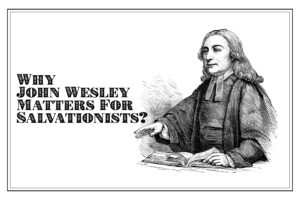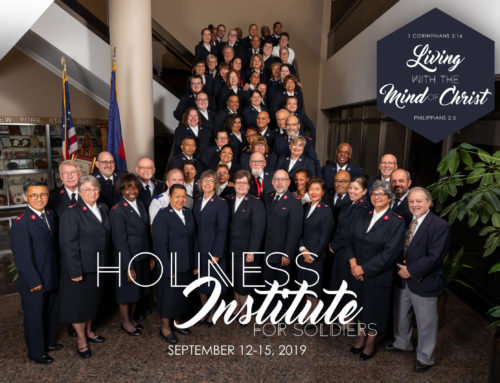 John Wesley’s life and his teaching on holiness have significantly influenced the Christian church in general and The Salvation Army in particular. Based on this premise, the inquiry of “why John Wesley matters for Salvationists?” leads to my twofold conviction that I want to share with my fellow Salvationists.
John Wesley’s life and his teaching on holiness have significantly influenced the Christian church in general and The Salvation Army in particular. Based on this premise, the inquiry of “why John Wesley matters for Salvationists?” leads to my twofold conviction that I want to share with my fellow Salvationists.
First, for Salvationists among other Christians, reading and studying Wesley’s classic writings on holiness should be an experience of blessing not only to deepen one’s view of Scriptural holiness but also to nurture one’s soul for holy living. For example, Wesley’s sermons should not only be considered as insightful personal devotional resources but also the foundational references for understanding Wesley’s passion and essential teaching of Scriptural holiness.
As the basic step for engaging Wesley’s sermons, I highly recommend you read the book, The Sermons of John Wesley: A Collection for the Christian Journey, edited by Kenneth J. Collins and Jason E. Vickers published by Abingdon Press(2013). The beauty of Wesley’s anthology is that these themed sermon collections provide the introductory comments on each sermon which are helpful and beneficial for grasping the basic contents of Wesley’s heartfelt messages in context. Also, I want to suggest you read Wesley’s classic work, A Plain Account of Christian Perfection. This is Wesley’s key textbook for demonstrating the most comprehensive exposition of his doctrinal teaching of holiness, particularly on the subject of Christian perfection.
As the key concept in his teaching on holiness, Wesley pronounced that the consummation of the process of sanctification is the stage called entire sanctification, which is essentially synonymous with the term Christian perfection. Although the word perfection is often used in the Bible (cf. Deuteronomy 18:13, Matt. 5:48, Hebrews 13:20-21), it was and still is the most misunderstood term in the Christian community, especially in the Wesleyan–Holiness tradition. Nevertheless, Christian perfection is the term that Wesley found to be the best way to describe his distinctive position on holiness. His vision was that Christian perfection is the goal of salvation for all Christians. In fact, he considered the doctrine of Christian perfection as “the grand depositum” of Methodism to the world.
Second, and particularly for Salvationists, it is necessary and a worthy effort to study Wesley’s theological legacy. The Salvation Army’s theological heritage on the doctrine of holiness is rooted in the teaching of John Wesley. To understand Wesley’s doctrine of holiness is to understand the heart of the Wesleyan distinctives of Salvation Army holiness theology. The origin and status of The Salvation Army’s doctrine are stated in the newly revised The Salvation Army Handbook of Doctrine (2010) as follows:
“Our [The Salvation Army] doctrinal statement…derives from the teaching of John Wesley and the evangelical awakening of the 18th and 19th centuries…The distinctives of Salvation Army doctrine came from Methodism (p. xviii).”
In my opinion, it is a serious concern among Salvationists worldwide that we are facing the issue of losing or fading our sense of unity based on the Wesleyan distinctive Salvationism. I strongly suggest that re-introducing some specific concepts or terms in relation to the Wesleyan doctrinal views on holiness, such as the terms of “prevenient grace,” “Christian perfection” or “entire sanctification,” be a significant effort to help and encourage Salvationists in order to deepen our understanding of the Wesleyan heritage of holiness teaching. At the same time, it will also contribute to providing an open invitation as a contact point among Salvationists and to others for leading a further serious dialogue/conversation to find each other’s common interests or different views of certain subjects.
When God raised The Salvation Army in 19th century England, it was through the Wesleyan holiness heritage. This is a significant and foundational part of the Salvationist theological establishment and it’s our responsibility as well as our privilege to dig deeper into that understanding. Through that understanding, not only will we build a bridge to our past but also be able to better understand our future.
The following words of prayer from Wesley are my personal blessing for you: “May the Spirit of Christ give us a right judgment in all things, and `fill us with all the fullness of God;’ that so we maybe `perfect and entire, wanting nothing.”
written by Major Young Sung Kim, Ambassador for Holiness, USA East




